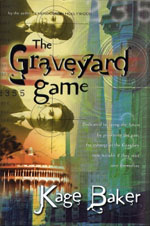This reaction contains spoilers for the first three novels in Kage Baker’s Company series. What I’m Reading reactions to these earlier novels are available: The Garden of Iden, Sky Coyote, and Mendoza in Hollywood.
END NOTE ABOUT SPOILERS
When I finished Mendoza in Hollywood, I was fairly convinced that I had a long wait ahead of me for The Graveyard Game: The original hardback from Harcourt had gone out of print, and the paperback would not be available until much later this year.
Then the fates smiled down upon me: Against all hope, a used copy appeared in Uncle Hugo’s. I immediately snatched it up and brought it home.
As I discussed in my previous reactions, the first Company novel, The Garden of Iden, is a novel which stands by itself. The second, Sky Coyote, also stands by itself, even while subtly beginning to lay groundwork for the series as a whole. Even the third novel, Mendoza in Hollywood, while being a clear sequel to the first novel, has an existence independent of the series (although the presence of the series’ meta-plot was increasingly evident).
But The Graveyard Game, by contrast, is simply an installment in the ongoing series: It has no independent existence of its own, and cannot be read as an individual novel at any level. The plot of the novel picks up the loose threads laid down in the previous novels and begins running with them: If the end of Mendoza in Hollywood left you full of questions, The Graveyard Game will immediately begin satisfying your appetite for answers.
The Graveyard Game, on the one hand, reminds me of a simplified version of The Illuminatus Trilogy via time travel – conspiracies are unraveled and mysteries at the very heart of civilization are revealed. On the other hand, it also reminds me of the Continuum roleplaying game, which had a very different philosophy when it came to time travel, but also looked candidly at what it would mean for someone to have a playground as large as human history without any practical authority to answer to.
Those comparisons are probably worthless to most of you, but its where the work resonated for me. (It also lightly reminded of Asimov’s End of Eternity, and experienced some truly fascinating parallels with Philip K. Dick’s Do Androids Dream of Electric Sheep?, which I started reading immediately afterwards. But I digress.)
Let me put it this way: The plot is a conspiracy-buster set within the immortal world of Baker’s time travelers. Watching conspiracies unwind themselves from within the framework of other conspiracies is a lot of fun (kind of like watching the Smoking Man channel Mulder). In fact, the entire book is best characterized as a fast-paced adventure story. (I’ve heard this book multiply described as the “darkest” of Kage Baker’s novels. I honestly don’t know where that’s coming from. Baker, in my opinion, has never been darker than she was in The Garden of Iden.)
For the first time, the Company novels take us into future history – and the result is mixed. On many levels, I’m fascinated by the narrative history she constructs (particularly at the subtle suggestion that, as the time for its own creation comes near, the Company’s interference with history grows increasingly drastic). But, on the other hand, Baker is also quite capable of giving my suspension of disbelief a rollercoaster ride. For example, when she asserts that only 25 years from now a set of incredibly popular fantasy novels about talking animals will trigger mandatory vegan laws and animal emancipation laws, my rapidly rising eyebrows nearly cracked my ceiling. That’s a little like claiming that the Harry Potter books will trigger a mass conversion to wicca. Her world-building also takes some truly unusual turns, and not all of them sit quite right with me. (I think I’d rather see her simply exploring the consequences of her central time travel thesis, rather than littering the playing field with other conceits.)
So, how to sum this up?
All in all, The Graveyard Game is something of a mixed bag. The plot is fun, but it also lacks the emotional depth and impact of the first three novels. Perhaps this fault can be laid at the choice of dual protagonists (which inevitably divides the thrust of the work). Or perhaps it’s the extended time period (several centuries) over which the book takes place (which inevitably dilutes the thrust). But, on the flip side, for those who have read the previous Company novels, the revelations found here are worth the price of admission all by themselves.
So I’m going to give this one a B. It’s a good book, neither flawed nor superlative.
GRADE: B
Kage Baker
Published: 2001
Publisher: Harcourt
Cover Price: $24.00
ISBN: 0-15-100449-8













